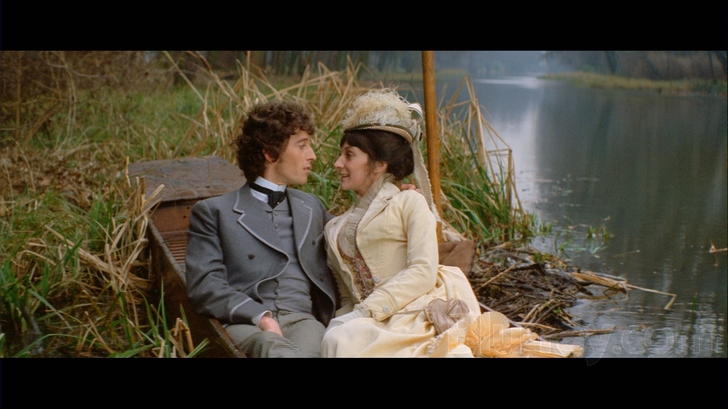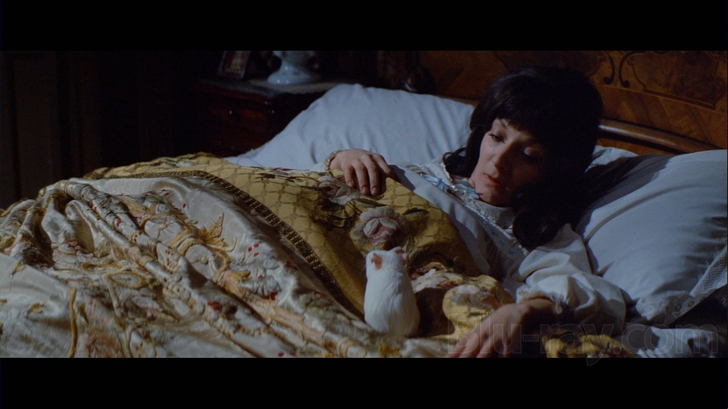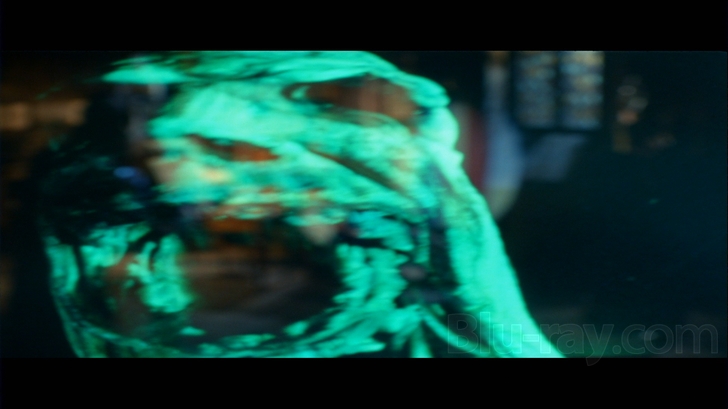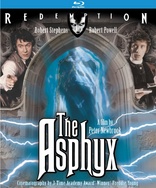The Asphyx Blu-ray Movie
HomeThe Asphyx Blu-ray Movie 
Redemption | 1972 | 1 Movie, 2 Cuts | 83 min | Rated PG | Apr 17, 2012Movie rating
6.6 | / 10 |
Blu-ray rating
| Users | 3.8 | |
| Reviewer | 3.0 | |
| Overall | 3.2 |
Overview
The Asphyx (1972)
Hugo is a brilliant turn-of-the-century scientist-loved and respected by his family and friends, admired by his colleagues. But he is a man quickly becoming obsessed with a curious and frightening question... what is the mysterious apparition found in the photographs of his dying subjects? Hugo brings to a family boating party his newest invention-a motion picture camera. The party quickly turns into a disaster as he captures on film the tragic drowning of his son and his fiancee. When the film is replayed later, the same ghostlike presence appears. It flies towards his son, and vanishes inside his dying body. Has Hugo discovered The Asphyx, the spirit of the dead described in Greek mythology?
Starring: Robert Powell (I), Robert Stephens, Jane Lapotaire, Alex Scott (I), Ralph ArlissDirector: Peter Newbrook
| Horror | Uncertain |
| Sci-Fi | Uncertain |
Specifications
Video
Video codec: MPEG-4 AVC
Video resolution: 1080p
Aspect ratio: 2.37:1
Original aspect ratio: 2.35:1
Audio
English: LPCM 2.0
Subtitles
None
Discs
50GB Blu-ray Disc
Single disc (1 BD)
Playback
Region free
Review
Rating summary
| Movie | 3.0 | |
| Video | 4.5 | |
| Audio | 4.0 | |
| Extras | 0.5 | |
| Overall | 3.0 |
The Asphyx Blu-ray Movie Review
A spirited British horror film.
Reviewed by Casey Broadwater April 2, 2012I'm a confessed sucker for any story involving the mid-to-late 19th century overlap of science and spiritualism. Between advances in electricity and the germ theory of disease--along with the game-changer of Darwin's Origin of Species--scientists and the public at large were increasingly aware that there was more to life than could be seen with the naked eye. Suddenly, subjects that had previously been confined to the realm of religion--like the supposed existence of the soul and the possibility of life after death--were open to scientific inquiry. What's embarrassing in retrospect is how notable scientists and philosophers like William Crookes and Henry James were so caught up in the psychic possibilities that they were duped by the chicaneries of two-bit mediums and trance artists, mesmerists and faith healers. It was all bunk, of course, little more than mind games and clever parlor tricks, but it's fun to imagine what might've happened if science had made profound paranormal discoveries before the turn of the 20th century. That's the basic premise of The Asphyx, a little-seen British sci-fi/horror film from 1973 that dabbles in spirit photography and the quest for immortality. It's not quite an undiscovered cult gem, but gothic horror fans will find a lot to love in its creaky Victorian setting and loveably lo- fi special effects.

Legendary stage actor Robert Stephens plays Sir Hugo Cunningham, a widower and scientist who's been keeping his "psychical research" from his new fiancee, Anna Wheatley (Fiona Walker), not wanting to offend her dainty sensibilities with what--by anyone's estimation--is rather grisly stuff. See, Sir Hugo has been taking photographs of human subjects as they die, and in each case he's found a strange black "smudge" on the negative, a spooky- looking mark that can't be attributed to a lens defect or a development error. Might this be the soul departing the body?
One of Sir Hugo's inventions, a moving picture camera--yes, he beat Edison and the Lumière brothers to it, apparently--allows him to take a more detailed look, albeit under tragic circumstances. While Hugo is filming Anna and his adult son Clive rowing across a river, Clive busts his head on a tree branch and the two capsize, drowning in the inky water. Now, as sci-fi films since Metropolis have shown us, there's nothing more dangerously driven than a scientist motivated by personal loss, so we know from the outset that Sir Hugo will go progressively mad trying to solve the scientific riddle of the smudge. Sure enough, he spots the mark on the film footage, but he discovers that it's actually moving toward Clive--not away from him--which rules out Hugo's departing soul theory. His "research into psychic phenomenon" leads him to hypothesize that the smudge is actually what the Greeks referred to as "the Asphyx," a spirit that approaches the body at the time of death and drags the soul to the underworld. (Never mind that there is no such Greek myth.)
A public execution gives Sir Hugo the chance to test his theory and his latest gizmo, the "light booster," a glorified lamp that uses phosphate crystals and dripping water to produce a bright blue tractor beam capable of making the Asphyx visible and then holding it in place. (One wonders if Dan Aykroyd and Harold Ramis saw The Asphyx before writing Ghostbusters.) Eventually, Sir Hugo's adopted son, Giles (Robert Powell)-- who, for an added complication, is in love with his sister, Christina (Jane Laportaire)--gets wise to the scientist's ultimate ambition: immortality. Sir Hugo suspects that if he can permenantly trap his own Asphyx in a "light chamber," it will be literally impossible for him to die. Of course, he does some animal and human trials first--on a guinea pig and a poor tuberculosis patient--and then proceeds to have Giles strap him into a homemade electric chair to goad the Asphyx into appearing. What could go wrong? Almost everything. As numerous sci-fi movies have also shown us, those who play God are cursed to reap what they've scientifically sown. Sir Hugo does indeed discover the secret to immortality, but his tinkering with the soul starts to go deadly wrong when he tries to convince Giles and Christina to join him in eternal life.
The Asphyx kind of loses it in its last act with some glaring narrative holes and few ridiculous decisions on the part of the characters--like, why would Sir Hugo use a guillotine and a gas chamber on Christina and Giles when the electric chair was already proven to work fine?--but I doubt you're approaching a movie like this expecting an airtight plot. What the film does do well is atmosphere, specifically the Victorian-era crossover of science and the occult, with old-timey, chemical reaction-driven brass-and-glass technology used to take on a screeching, skull-like apparition with gnarly teeth. It tickles the geekier parts of my anatomy, and I can see how some might look on the film fondly as a sort of precursor to the steampunk genre. But make no mistake--this is b-movie material through and through, especially when compared to another horror film that came out the same year, The Exorcist. Still, there's a lot of campy charm here. The script is alternately goofy and overwrought--"Think man! Think of the power!"- -and the effects are really no more advanced than those in many Georges Méliès films from the turn of the century. As for the acting, even with Robert Stephens on board--who was at one point the heir apparent to Laurence Olivier--the performances are given to hammy theatricality. That's not to say The Asphyx doesn't have a certain layer of polish. The production design is fantastic--the laboratory equipment, the costumes, even the choice of exteriors--and the film was beautifully photographed by famed cinematographer Freddie Young, who's best known for his Academy Award-winning work with David Lean on Lawrence of Arabia and Doctor Zhivago.
The Asphyx Blu-ray Movie, Video Quality 

Kino and Redemption Films have teamed up for quite a few titles now, but The Asphyx is hands down the duo's best-looking Blu-ray release thus
far. As I mentioned above, David Lean's go-to guy Freddie Young was the cinematographer here, and you can tell from the lighting and compositions and
focus that there was a real pro behind the lens. More so, the film has received a fantastic restoration, culminating in a 1080p/AVC-encoded transfer
that's clean, sharp, and colorful. The 35mm print is practically spotless aside from a few blink-and-you'll-miss-'em white specks, and as usual from Kino,
you can expect an image that hasn't been slathered in DNR or artificially boosted with edge enhancement. The grain structure looks entirely natural and
the picture is crisp enough as it is, with a level of detail that far surpasses what could be seen on previous DVD releases. From the costumes and props to
the actors' facial features--everything looks cleaner and more finely resolved. Color is stable and balanced too, with a rich warm palette periodically
interrupted by some bright ectoplasmic blues. Contrast and black levels, likewise, are spot-on.
Not that the disc includes both the theatrical cut (1:26:52) and an extended version (1:39:01), which features a lot of additional
dialogue and some small character-driven moments that had been previous chopped out. Unfortunately, the extra footage from the extended cut isn't in
nearly as good of shape. Here's the disclaimer you'll read when you choose to play the extended version:
-
"This reconstruction of the extended version of The Asphyx blends HD footage mastered from the 35mm negative with SD footage mastered
from a U.S. release print (of inferior quality). As a result, significant shifts in image quality will occur."
The Asphyx Blu-ray Movie, Audio Quality 

I'm used to relatively low-budget 1970s horror films having crackly, sometimes muffled audio, but The Asphyx sounds clear and clean, with a Linear PCM 2.0 track that's free of pops, splice noises, and drop-outs. Dialogue is the focus here--it's always well-recorded, balanced in the mix, and easily understood--but there are also some surprisingly potent effects for a film of this age, like the shrill screaming of the Asphyx as it gets sucked toward the light. Much of the film goes unscored, but there are occasional classical cues, and these all sound fine. My lone complaint is that the disc includes no subtitle options for those who might need or want them.
The Asphyx Blu-ray Movie, Special Features and Extras 

- Theatrical Trailer (1080p, 2:02)
- Stills Gallery (1080p)
- Redemption Trailers (1080p): Includes trailers for Virgin Witch (1:51) and Killer's Moon (2:32).
The Asphyx Blu-ray Movie, Overall Score and Recommendation 

An old-fashioned morality-driven fright film about the dangers of playing God, The Asphyx is no forgotten masterpiece, but it is a fun piece of gothic b-horror that explores the short-lived Victorian-era intersection between science and the supernatural. For a movie of this sort, it features excellent production design and cinematography, which correlates to a surprisingly striking Blu-ray presentation. Recommended for all Hammer Horror hounds, steampunk tinkerers, and wannabe Spiritualists.
Similar titles
Similar titles you might also like

Victor Frankenstein
2015

Diary of a Madman
1963

The Creeping Flesh
1973

The Vampire Lovers
Collector's Edition
1970

Horror of Dracula
Dracula / Warner Archive Collection
1958

Zoltan, Hound of Dracula 4K
Dracula's Dog / Kino Cult #16
1977

Spring
2014

Dr. Jekyll and Mr. Hyde
Warner Archive Collection
1931

The Man Who Could Cheat Death 4K
Slipcover in Original Pressing
1959

Chamber of Horrors
1966

Dr. Jekyll and Mr. Hyde
Deluxe Edition
1920

The Last Voyage of the Demeter
Collector's Edition
2023

The Void
2016

The Blood Beast Terror
2K Restoration
1968

Black Sabbath
AIP Cut | 60th Anniversary
1963

From Beyond 4K
Slipcover in Original Pressing
1986

The Incredible Melting Man 4K
Slipcover in Original Pressing
1977

Frankenstein Created Woman
Collector's Edition
1967

The Quatermass Xperiment
Special Edition | The Creeping Unknown
1955

The Revenge of Frankenstein
1958

